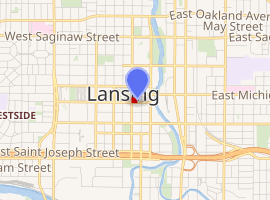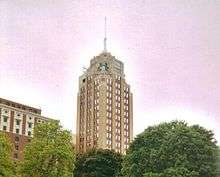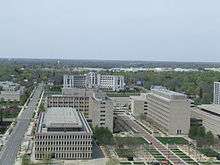Boji Tower
The Boji Tower, also known as the Olds Tower, is a historic 23-story building located at 124 Allegan Street, in Lansing, Michigan. It has been the tallest building in Lansing since its completion in 1931. On December 6, 2005, the building was added to the National Register of Historic Places as the Capital Bank Tower.[1]
| Boji Tower | |
|---|---|
Boji Tower as seen looking west over Allegan Street | |

| |
| General information | |
| Type | Office |
| Location | 124 West Allegan Street, Lansing, Michigan, USA |
| Construction started | 1929 |
| Completed | 1931 |
| Height | |
| Antenna spire | 110.9 m (364 ft) |
| Roof | 90.5 m (297 ft) |
| Technical details | |
| Floor count | 23 above ground & 2 underground |
| Floor area | 185,188.77 sq ft (17,204.600 m2) |
| Design and construction | |
| Architect | Hopkins & Dentz |
Capital Bank Tower | |
| Location | 124 West Allegan Street, Lansing, Michigan |
| Coordinates | 42°43′58″N 84°33′11″W |
| Area | less than one acre |
| Built | 1931 |
| Architect | Hopkins and Dentz; Builder: Hutter Construction Co. |
| Architectural style | Art Deco, Skyscraper |
| MPS | Downtown Lansing MRA |
| NRHP reference No. | 05001357[1] |
| Added to NRHP | December 6, 2005 |
History
The tower was originally constructed as the Olds Tower, named after the automotive industrialist, Ransom Eli Olds, who was the main financier of the tower project assisted by Edmund C. Shields of the local law firm of Thomas Shields & Silsbee.[2] Shortly thereafter it was renamed Capital National Bank Tower, after the bank that Ransom Eli Olds helped form. The cornerstone was laid on November 14, 1929.[2]
It became the Michigan National Bank Tower in 1954, and held that name until 2001 when Standard Federal Bank purchased Michigan National Bank. At the request of Standard Federal, the owners of the tower removed the historic neon 'Michigan National' sign in that year. After four-and-a-half years without a name, the Boji family, a father and son development team of Iraqi descent who owned the tower since 1998, renamed it the Boji Tower in 2005.[3]
The tower has been through one major expansion which occurred between 1965 and 1967, which include the addition of an 11-story annex built directly adjacent to the front of the tower. The tower has undergone multiple minor renovations since 1998 under the Boji Group's ownership. In November 2007, the building's original antenna tower for WITL-FM was replaced via helicopter with a new antenna for WJZL.[4]
Description
At 23 stories, and 297 feet (91 m), the brick and limestone-faced tower, with its tall, narrow profile topped with a spire and beacon, is a typical American skyscraper design of the Art Deco era of high-rise architecture. It includes four engraved panels in the portals of the main passenger elevators that reflect themes of labor and industry. The tower's facade consists of 654,000 bricks of 17 different colors. The building is occupied by a mix of office, retail, and government tenants. The two-story former banking lobby is now used as the main hearing room for the Michigan Senate.
The sculpture on the building, including the doors, was created by Ulysses Ricci.[5]
Photo gallery
 View from Grand Avenue
View from Grand Avenue
 West side
West side View of State Government Complex from Boji Tower
View of State Government Complex from Boji Tower
References
- "National Register Information System". National Register of Historic Places. National Park Service. July 9, 2010.
- Dawe, Eric. "Lansing Celebrating 150 Years". WILX News. Archived from the original on 2010-01-22. Retrieved 30 December 2012.
- Dozier, Vickki (26 January 2018). "From the Archives: Old banks and Michigan's first drive-in bank". Lansing State Journal. Retrieved 14 July 2020.
- Austerman, Mike (5 November 2007). "WJZL making progress on power increase". Michiguide. Retrieved 7 March 2012.
- Hendry, L Fay (1980). Outdoor Sculpture in Lansing, photographs by Balthazar Korab. Okemos, Michigan: Iota Press. pp. 30–34. ISBN 978-0936412023.
External links
| Wikimedia Commons has media related to Boji Tower. |